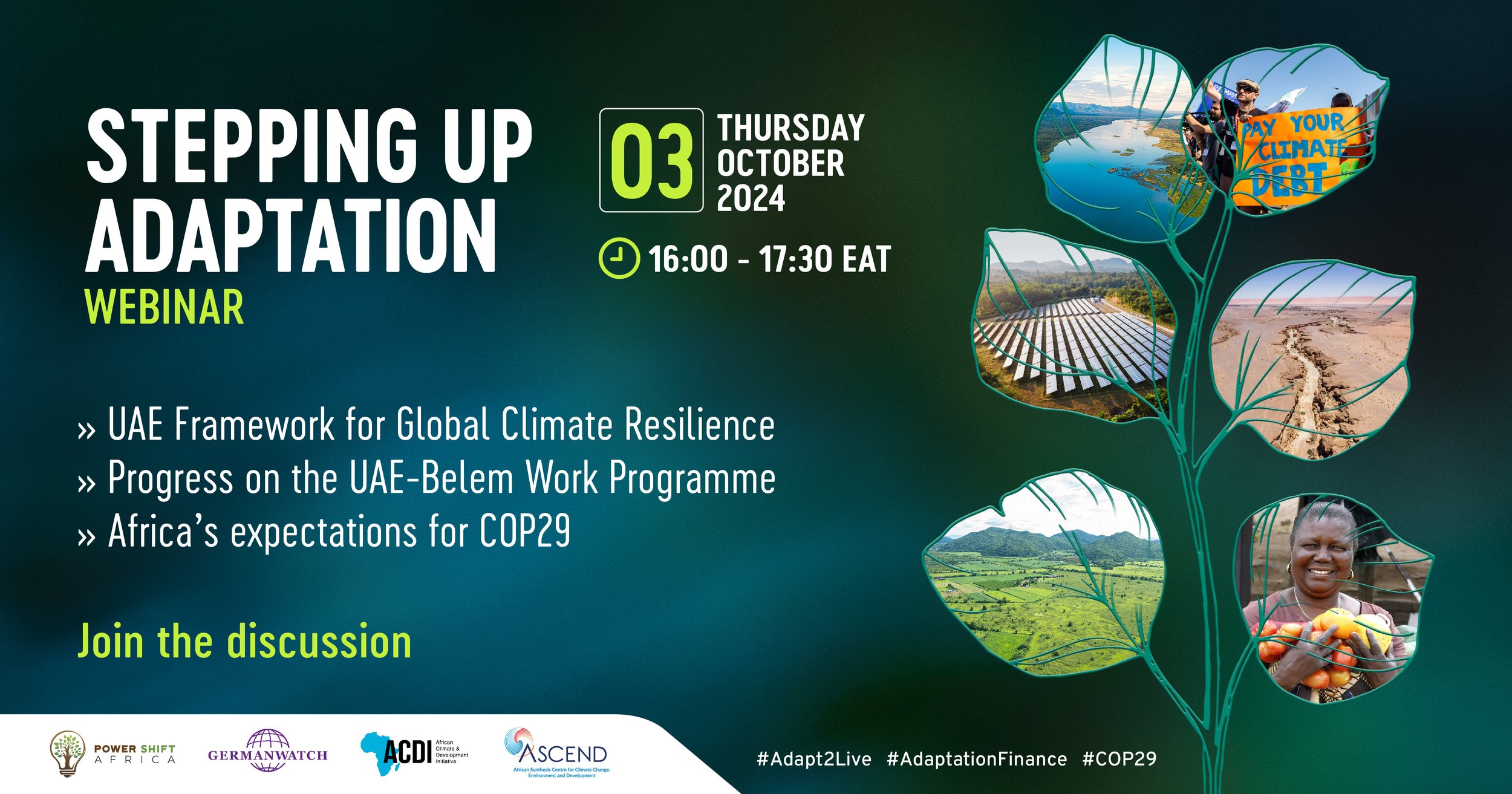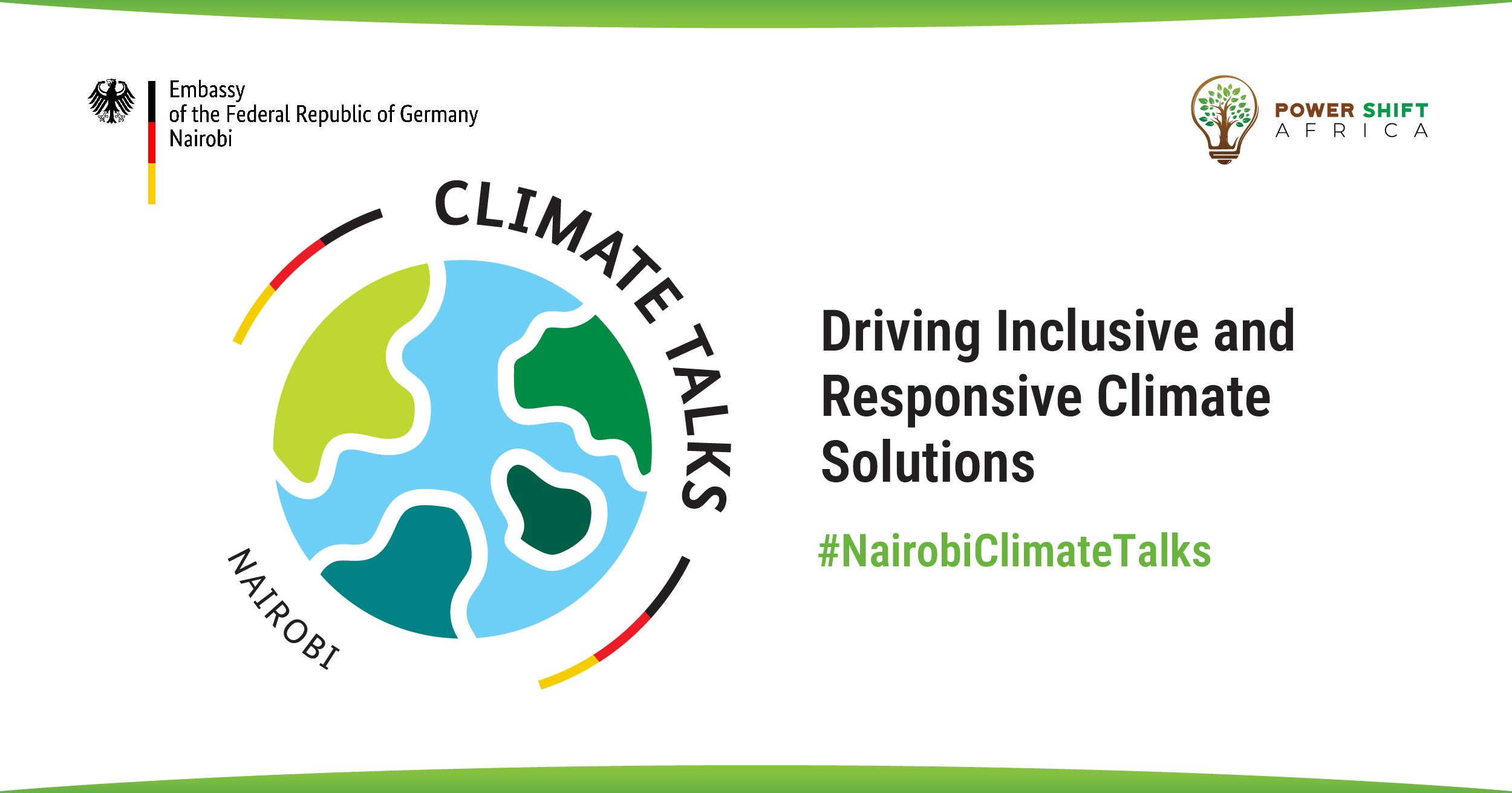Events

WEBINAR: Stepping up Adaptation
In preparation for the upcoming UAE-Belém workshop on indicators in October, this webinar seeks to enhance the awareness and understanding of African civil society and the general public regarding a critical adaptation negotiation track under the Paris Agreement. The webinar will explore the UAE-Belém work programme, which is central to developing indicators to measure progress towards the Global Goal on Adaptation (GGA).
Discussion points will include:
Overview of the UAE-Belém Work Programme: A brief summary of the programme’s objectives and timeline for developing GGA indicators.
Current State of Negotiations: An analysis of the negotiation progress, highlighting barriers and opportunities
Indicators for GGA Tracking: A comparison between current and proposed indicators, assessing their effectiveness and relevance.
African Expectations for COP29: A discussion on Africa's key priorities and desired outcomes for the upcoming climate conference.
This webinar provides a platform to discuss these critical issues and strengthen African engagement in the adaptation process.

Next generation NDCs for Kenya: Effective participation towards ambitious climate adaptation
To achieve long-term goals on climate change mitigation and adaptation, parties to the Paris Agreement are required to submit Nationally Determined Contributions (NDCs) every five years that reflect rising ambitions while taking into consideration their respective national capabilities and circumstances. The last round of NDCs was submitted in 2020-2021, while the next round will be submitted in 2025.
In the last round of NDCs, only 106 of the 148 countries included adaptation components. There are two main reasons behind this - first, inclusion of adaptation was optional. Secondly, whilst mitigation is measurable - as it responds to a global quantified commitment to reduce emissions - adaptation on the other hand is a national effort to reduce a country’s population’s risk and vulnerability to climate change and its impacts. It is difficult to measure and takes diverse forms based on country needs and capacities.
Countries worldwide have been struggling to adapt to climate change, as was also the case in Kenya with the drought that ended in 2023 and the deadly floods in early 2024. This is compounded by inadequate financial, technological, and capacity building resources dedicated to climate adaptation. However, without sufficient means of implementation, it will be difficult to agree on even greater ambition in the next round of NDCs.
As per recommended practice, NDCs in Kenya are connected to comprehensive national plans, policies and legal frameworks. With respect to adaptation, reference is made to the Constitution of Kenya 2010, the Climate Change Act, 2016, as amended in 2023, Vision 2030, the National Climate Change Action Plan (NCCAP) 2023-2027 and the National Adaptation Plan 2015-2030. Kenya’s latest NDC of 2020 had comprehensive mitigation and adaptation components which were costed. The total cost of implementing mitigation and adaptation actions in the NDC was estimated at USD 62 billion while adaptation actions up to 2030 was costed at approximately USD 43.9 million.
The session will discuss adaptation planning in the NDC process in Kenya and identify opportunities for participation in this process.
Objectives of the Convening
The German Embassy Nairobi is partnering with Power Shift Africa to convene the second session of the Nairobi Climate Talks 2024. This session will bring together stakeholders working on climate adaptation in Kenya uniting perspectives from government, civil society, think tanks, industry and politics to generate insights and promote collective action that addresses Kenya’s current realities. The discussions will focus on Kenya’s NDC development process with respect to adaptation, its opportunities for participation, challenges and solutions for ambitious adaptation planning, and establishing links between Kenya’s NDC and National Adaptation Plan.
Guiding questions
How can Kenya’s next generation NDC be developed to both reduce emissions and increase resilience? How can this be reconciled with the Kenya National Adaptation Plan 2015-2030, and the right to development of Kenya?
How can we ensure Kenya’s new NDC is implemented in line with Kenya’s adaptation goals? What type of support is needed to develop and implement adaptation goals identified in Kenya’s NDC and National Adaptation Plan?
The new collective quantified goal on climate finance, to be agreed at COP29, aims to assist vulnerable countries cope with climate action. How can Kenya’s NDC make use of this opportunity to address the financing gap for adaptation?
How can frontline communities, civil society, industry, women and youth effectively participate and contribute in developing the next generation NDC for Kenya?
How can CSOs best engage in negotiations to strengthen the adaptation dimension including at COP 29 in Baku this year?
Recommended readings:
(publications do not necessarily reflect the views of the German govt): United Nations Environment Programme, Adaptation Gap Report, 2023 https://www.unep.org/resources/adaptation-gap-report-2023
World Wide Fund For Nature, NDC Checklist: Kenya Analysis, 2021https://wwfint.awsassets.panda.org/downloads/ndcs_we_want_checklist___kenya.pdf
African Development Bank, Analysis of Adaptation Components of Africa’s Nationally Determined Contributions (NDCs), 2019 https://www.afdb.org/fileadmin/uploads/afdb/Documents/Generic- Documents/Analysis_of_Adaptation_Components_in_African_NDCs_2019.pdf
African CSOs Workshop on Climate Adaptation & Resilience
The in person convening in Arusha is a unique opportunity to bring together stakeholders across the continent working on climate adaptation and resilience issues. The key objectives of the workshop are to: » Share policy and community experiences, learnings, and best practices related to climate adaptation and resilience » Co-create a common Pan-African vision, strategy, and approaches to address climate adaptation and resilience issues across the continent » Identify key moments and spaces to use the Pan-African strategy and approaches to move climate adaptation and resilience issues up the global political agenda » Co-create and co-evolve Pan-African policy positions on the Global Goal on Adaptation, climate finance for adaptation, agriculture, and more.



